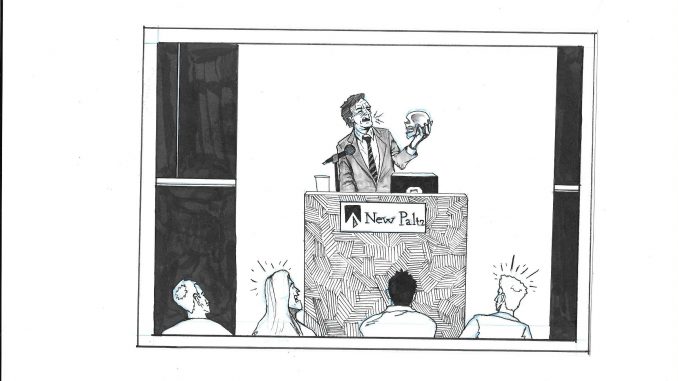
The student body has experienced it before: an invited speaker causing an unnecessary controversy on the campus they were paid to appear at.
On Monday, March 13, Robert F. Kennedy, Jr. spoke to a packed Lecture Center Room 100 as part of the Distinguished Speaker Series, sponsored by the New Paltz Foundation. He was paid the full amount to attend, $3,000, despite the fact that he failed to attend a scheduled interview with one of our reporters as well as a planned Q&A session with the Honors Program. Instead, he arrived late, shared dinner with President Donald P. Christian and then spoke at his lecture, which was supposed to focus on his work as an environmentalist.
However, during the Q&A segment of his lecture, Kennedy spoke about the negative aspects of vaccines, questioning their mercury levels before engaging in what was essentially an argument with a man with autism. The man asked about Kennedy’s involvement with the Trump administration on a commission concerning vaccines, at which point Kennedy took the opportunity to delve into his personal views.
All promotional material around campus emphasized his involvement with Riverkeeper. When asked for comment following the event, Christian declined, only stating that he “wished the questions had focused on what Mr. Kennedy spoke about.”
In an interview with The Oracle earlier this month, Christian stated that he believed the controversy involving Kennedy and vaccines had been addressed years prior and that Kennedy would be able to handle himself should a question about it arise. It is clear that this was not the case.
Shifting accountability for what invited speakers say is nothing new. In a debate held last fall, Cliff Kincaid utilized his speaking slot as an opportunity to berate reporters, the administration and the college, due to the cancellation of the same scheduled event in Spring ‘16. Despite being invited to participate in a political discussion with his opponent, Kincaid strayed from his talking points. Kennedy’s use of the event as a platform for voicing personal grievances closely mirrors what happened in the fall.
We at the The New Paltz Oracle fully advocate for free speech on campus and the open exchange of ideas. However, we also believe that there should be more consideration given to whom the school invites to speak here and more importantly, who they pay to speak here. As a public university, our reputation is at stake after having multiple speakers drift from the very topic they were paid to speak on, to push their own political agenda.
At our free speech event on Tuesday, March 28, we called on the administration to invite intellectually diverse speakers, as they have promised to do in the past. We do not, however, want uninformed views to be spread to the student body, especially through a sponsored school event. Intellectual diversity requires, above all else, intellectual thought. If a speaker is not cooperative in the mission to inform the audience of a different viewpoint, then there is nothing to be learned.
To be clear, these rants have no value as a learning opportunity for students and the community at large. It must be asked, though, why there is no form of moderation for speakers we invite to campus. If the administration, which organizes and runs these events, does not want a speaker to stray from the focus of their lecture, can they not simply step in and diffuse the situation?
It is also fair to say that the risk of Kennedy switching the focus of his lecture was evident. Though his work with Riverkeeper was prevalent in the scope of the event, he has publicly spoken out against vaccines before and has gained attention for his claims, including from the President of the United States.
When looking at the mission statement for the New Paltz Foundation, it mentions that private gifts to the foundation, “enhance the teaching, learning and discovery that takes place on campus, and allows New Paltz to enrich the cultural, economic and social fabric of the Mid-Hudson region.” We question where Robert F. Kennedy Jr. fits into that narrative of education and personal growth.
With this mission in mind, we think it would be appropriate for students to be involved in the selection process for the speakers who come here. We must question what the selection process is for these speakers and what criteria goes into place for choosing them. Since the target audience for these lectures are supposed to be the students, perhaps having their input or at least keeping them informed of who is being considered, would be a way to improve these events going forward. Students should be given priority on a campus, not shuttled away to an overflow room during a sponsored speaker event.
